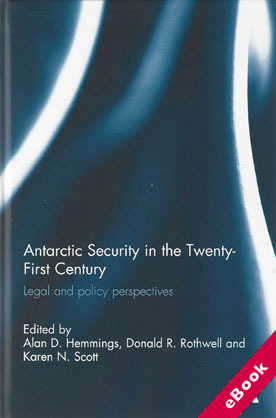
The device(s) you use to access the eBook content must be authorized with an Adobe ID before you download the product otherwise it will fail to register correctly.
For further information see https://www.wildy.com/ebook-formats
Once the order is confirmed an automated e-mail will be sent to you to allow you to download the eBook.
All eBooks are supplied firm sale and cannot be returned. If you believe there is a fault with your eBook then contact us on ebooks@wildy.com and we will help in resolving the issue. This does not affect your statutory rights.
The Antarctic Treaty (1959) was adopted for the purpose of bringing peace and stability to the region and to facilitate cooperation in scientific research conducted on and around the continent.
One of the prime motivators in the conclusion of the Antarctic Treaty was security, as considerable tension existed over Antarctica with the overlapping claims of Argentina, Chile and the United Kingdom on the Antarctic Peninsula. More generally, the two Cold War protagonists – the (then) USSR and US – had a significant presence on the continent and had reserved their rights to make a territorial claim to the continent.
Therefore the Antarctic Treaty, founded on the principles of peaceful purposes, de-militarisation, non-nuclearalisation and the promotion of scientific research, created a new security construct for Antarctica.
It is now been over fifty years since the Antarctic Treaty’s entry into force, nevertheless, security continues to both drive and shape the legal and policy regime which applies to Antarctica. This book explores a wide range of Antarctic and Southern Ocean issues through the lens of security.
The contributions to this volume engage with a security discourse which has expanded beyond the traditional military domain to include notions of economic security, environmental security, food security, bio-security, heath security and human security. The chapters consider topics such as the implications for Antarctica and the Southern Ocean of the growing strategic competition between the rising powers of Asia, the possible effects of climate change on the authority, legitimacy and effectiveness of the Antarctic Treaty System, and the shift from 'strategic' security to 'human' security and its potential consequences for the Antarctic treaty regime.
This book will provide a contemporary and innovative approach to Antarctic issues which will be of interest to scholars of international law, international relations, security studies, political scientists, geographers as well as policy makers, lawyers and government officials interested in the region.